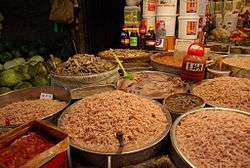젓
| ||||||||||||
Korean

새우젓 (salted fermented shrimp)
Etymology
First attested in the Eoje naehun, (御製內訓 / 어제내훈), 1475, as Middle Korean 젓 (ces). Derived from the -s substantivation of 절— (jeol-, “to be salted, to be seasoned with salt”).
Pronunciation
- IPA(key)[t͡ɕʌ̹t̚]
- Phonetic Hangul[젇]
|
Noun
젓 • (jeot)
- jeot, salted seafood, pickled seafood
- 새우젓, 토화젓, 액젓, 멸치젓 등 여러가지 젓갈들이 경동시장의 어느 가게에 쌓여 있다.
- Sae-ujeot, tohwajeot, aekjeot, myeolchijeot deung yeoreogaji jeotgaldeuri gyeongdongsijang-ui eoneu gagee ssayeo itda.
- Various jeotgal, such as jeot made from small shrimp, freshwater shrimp, fish and anchovies, are being sold at a store in the Gyeongdong Market.
Synonyms
- 젓갈 (jeotgal)
Derived terms
- 새우젓 (sae-ujeot)
- 오젓 (ojeot)
- 육젓 (yukjeot)
- 토하젓 (tohajeot)
- 맛젓 (matjeot)
- 황새기젓 (hwangsaegijeot)
- 멸치젓 (myeolchijeot)
- 조기젓 (jogijeot)
- 조개젓 (jogaejeot)
- 굴젓 (guljeot)
- 어리굴젓 (eoriguljeot)
- 명란젓 (myeongnanjeot)
- 창란젓 (changnanjeot)
- 오징어젓 (ojing-eojeot)
- 꼴뚜기젓 (kkolttugijeot)
This article is issued from
Wiktionary.
The text is licensed under Creative
Commons - Attribution - Sharealike.
Additional terms may apply for the media files.